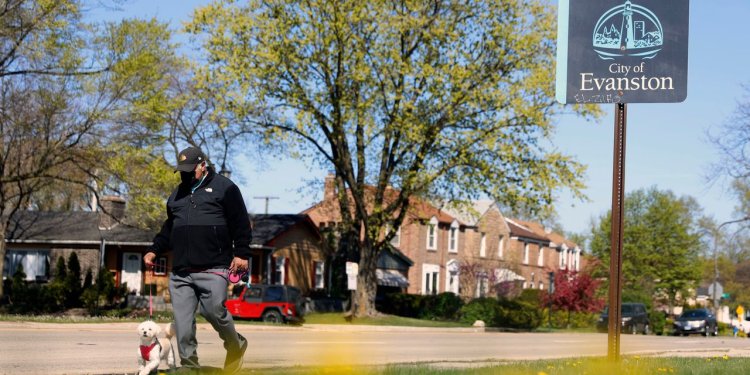Chicago Suburb Pays Reparations to Black Residents in a ‘Test Run for the Whole Country’
Evanston, Ill., has committed to spending $10 million over 10 years for discrimination The Chicago suburb is paying reparations to Black residents who experienced housing discrimination. Shafkat Anowar/Associated Press Shafkat Anowar/Associated Press By Joe Barrett | Photographs by Oriana Koren for The Wall Street Journal Updated July 10, 2023 10:43 am ET EVANSTON, Ill.—Louis Weathers still remembers one of his first experiences with racial prejudice in this Chicago suburb along Lake Michigan, home of Northwestern University. At his integrated junior high school, a white teacher didn’t want Black students such as Weathers showing up their white classmates with the right answers to questions, he


EVANSTON, Ill.—Louis Weathers still remembers one of his first experiences with racial prejudice in this Chicago suburb along Lake Michigan, home of Northwestern University.
At his integrated junior high school, a white teacher didn’t want Black students such as Weathers showing up their white classmates with the right answers to questions, he recalled.
“Every time we raised our hand, she wouldn’t call on us, but when we didn’t raise our hands, she would—to make you look like a dummy,” Weathers said. “We got onto that, though. When we didn’t know the answer, we raised our hands.”
Now 88 years old, the retired postal worker and Korean War veteran is among the initial beneficiaries of a city program—the first of its kind in the U.S.—that pays Black Evanston residents reparations for discrimination and a lack of access to housing. It is also working on programs to address gaps in education and economic development.
In 2019, the city of about 75,000 just north of Chicago committed to spend $10 million over 10 years on local reparations. Dozens of other municipalities across the U.S. have taken initial steps toward reparations since.
Nearly four years later, Evanston is the only city that is delivering on its promise. By the end of this year, it expects to have distributed $25,000 each to 140 mostly elderly residents like Weathers who were at least 18 and lived in the city between 1919 and 1969, when the city passed a fair-housing ordinance. The payments can come in either vouchers or cash and are funded by marijuana and real-estate transfer taxes.
“I see it as like a test run for the whole country,” said Justin Hansford, a leading advocate for reparations at the federal and local level and head of the Thurgood Marshall Civil Rights Center at Howard University.

Louis Weathers received $25,000 as part of a reparations program in Evanston.

Weathers holds up his name tag from the 50th-year high-school reunion at Evanston Township High School.
Weathers remembers discrimination in many aspects of life in Evanston beyond the school, including being excluded from the YMCA as a boy. He lived most of his life in the historically Black Fifth Ward and was only able to move to a predominantly white neighborhood in 1969 when laws started to change. Still, when he and his wife wanted to buy a house in a white neighborhood, he had to threaten that he would complain to the real-estate board if the agent didn’t allow them to sign a sales contract. “We wanted that house so bad,” he said.
His young son was called a derogatory name when they first moved in, but he later made friends with the white boy who called him that, Weathers said.
Weathers said he gave his $25,000 to his son, who put it toward debt reduction and upgrades to his condo.
Evanston’s modest program to compensate for decades of discrimination faced plenty of internal challenges and comes as grander efforts at reparations could be years off—if they come at all.
A task force in California last month recommended spending billions on reparations. Many of the proposals are expected to face an uphill battle for adoption.
Meanwhile, a federal bill introduced every year since 1989 that would establish a similar task force to study reparations at the national level has never been voted on in the U.S. House of Representatives, and isn’t likely to be under Republican control, advocates said.
Evanston Mayor Daniel Biss said he isn’t deterred by the lack of progress on national reparations.
“Our job here is just to move forward and to continue being that example, to continue illustrating that a small municipality can make real tangible progress,” he said.
Evanston’s road to reparations began with Robin Rue Simmons,
the then-city council member representing the predominantly Black Fifth Ward. She was aware of the reparations movement, but had long considered it a national issue dealing directly with slavery. Then she realized some local policies—such as zoning that concentrated Blacks in one neighborhood—led to overcrowding, redlining, fewer city amenities and other harms. In early 2019, she said, she began to think that she could hold her own city accountable for those wrongs.
Robin Rue Simmons, a former Evanston city council member, heads Evanston’s reparations committee.
“We’ve done all forms of affirmative action and equity work that has been really good, but we have not repaired the past harm by the municipal government,” she said.
With strong input from the community, the city passed its plan to spend $10 million on reparations in November 2019.
A local reparations committee that Rue Simmons now heads took applications from more than 670 people who either lived in Evanston during the period of greatest harm, or were their children. The city held a public drawing to identify the first 16 people to receive $25,000 vouchers that could be used to reduce mortgage debt, go toward a down payment or make repairs on a home.
Initially, the city planned to fund the program through marijuana tax revenue, but those revenues were coming in too slowly, so the city council voted to use funds from the real-estate transfer tax on higher-value properties.
The voucher program worked well for most of the initial recipients, but Kenneth Wideman, a 77-year-old Vietnam vet and retired maintenance worker for Northwestern, and his sister were renters who had no interest in buying a home at this point in their lives.

Kenneth Wideman is a lifelong Evanston resident, a Vietnam War veteran and a recent recipient of a reparations payment.
Wideman remembers growing up in his aunt’s five-bedroom home with 14 people living there, sharing a bedroom with his grandmother, mother and sister. He said he was unaware at the time of the kind of discrimination that forced that kind of crowding, but he remembers a happy childhood. “I was raised by women,” he said. “They made me the man I am today.”
Just before the time limit ran out on his ability to accept a voucher, the city council changed the rules so he and other recipients could receive cash instead of a voucher.
“We have not received real reparations, the 40 acres and a mule” that were promised after the Civil War, he said. “I wish people behind me would get that and more than what I got.”
SHARE YOUR THOUGHTS
Should other places follow Evanston’s example and pay reparations? Join the conversation below.
Rue Simmons said the new cash option has reduced the amount of staff work needed to disburse funds, but has raised questions about taxes and whether the award could affect the recipient’s ability to get aid from other programs. The city and committee are working their way through those issues, she said.
The city’s reparations committee is going through the verification process for the more than 500 direct descendants of the initial 140 recipients, who will also get reparations. Subcommittees within the group are also exploring how it can address educational disparities and bolster economic development for Black residents.
Ramona Burton, a 74-year-old recipient of a $25,000 housing voucher, was born in Chicago because there was no hospital for Black deliveries in Evanston. Her father was a chauffeur for the family that owned the Oscar Mayer meat company and they helped him buy the Evanston house she grew up in.
“They lent him the money for the down payment because back then they were redlining so Black and brown people couldn’t get loans for homes, and they were also putting them in certain neighborhoods,” said the retired administrative assistant.
She used her $25,000 voucher on new windows, a new roof, chimney repairs and an update to the electric system in the home where she has lived since the 1970s.
“I think it’s a good start,” she said of Evanston’s program. “It’s better than a blank.”
Write to Joe Barrett at [email protected]
What's Your Reaction?













